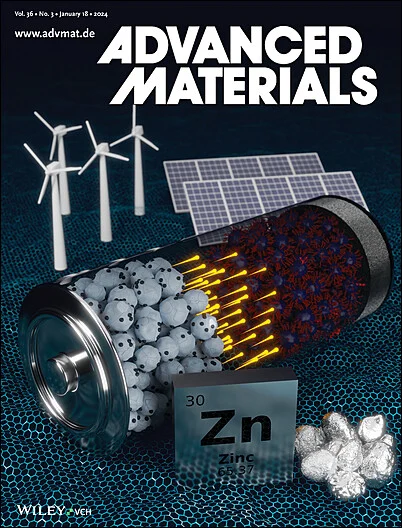Generating Self-Adjuvated Nanofiber Vaccines by Coating Bacterial Flagella with Antigens
IF 27.4
1区 材料科学
Q1 CHEMISTRY, MULTIDISCIPLINARY
引用次数: 0
Abstract
Bacteria-based vaccines have received increasing attention given the ability to induce strong systemic immune responses. However, the application of bacteria as therapeutic agents inevitably suffers from infection-associated side effects due to the living characteristics. Here, the use of bacteria-derived flagella is described to construct self-adjuvated nanofiber vaccines. With the help of charge-reversal mediated by decoration with cationic polymers, the flagella can be coated with negatively charged antigens through electrostatic interaction. By virtue of the large aspect ratio, the resulting nanofiber vaccines show prolonged retention at the injection site and increased uptake by dendritic cells and macrophages. Thanks to the innate immunogenicity, self-adjuvated flagella robustly promote dendritic cell maturation and macrophage polarization, resulting in the elicitation of antigen-specific T-cell and B-cell immune responses. In ovalbumin-overexpressing melanoma-bearing mice, immunization with ovalbumin-carried vaccines not only exhibits a favorable tolerance, but also displays superior inhibition efficacies on tumor growth and metastasis separately under the therapeutic and prophylactic settings. The flexibility of this approach is further demonstrated for vaccine fabrication by coating with the SARS-CoV-2 Spike protein S1 subunit. Bacterial flagella-based self-adjuvated nanofiber platform proposes a versatile strategy to develop various vaccines for disease prevention and treatment.

求助全文
约1分钟内获得全文
求助全文
来源期刊

Advanced Materials
工程技术-材料科学:综合
CiteScore
43.00
自引率
4.10%
发文量
2182
审稿时长
2 months
期刊介绍:
Advanced Materials, one of the world's most prestigious journals and the foundation of the Advanced portfolio, is the home of choice for best-in-class materials science for more than 30 years. Following this fast-growing and interdisciplinary field, we are considering and publishing the most important discoveries on any and all materials from materials scientists, chemists, physicists, engineers as well as health and life scientists and bringing you the latest results and trends in modern materials-related research every week.
 求助内容:
求助内容: 应助结果提醒方式:
应助结果提醒方式:


